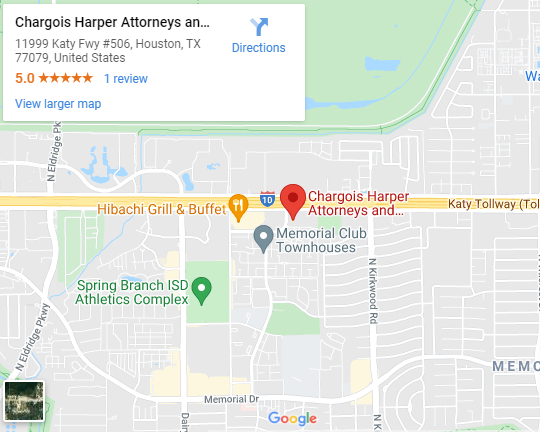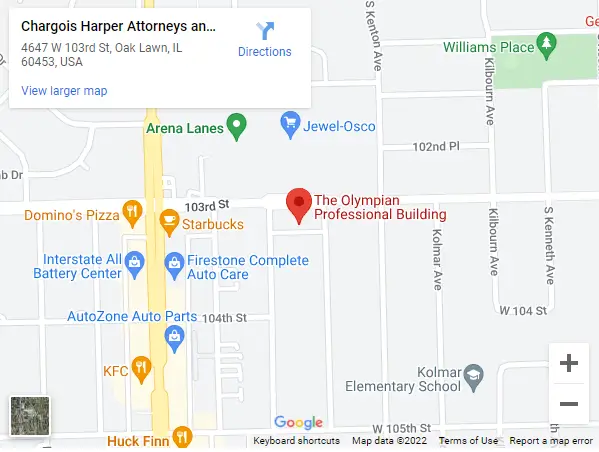Probate
Houston Probate Attorneys in Texas
If you are going through a probate matter in Texas, then it is best to seek out the services of a skilled Houston probate attorney. Without a good attorney representing your interests, you may not be able to fully protect your estate. At Chargois Harper Attorneys and Counselors at Law, we have over 30 years of experience successfully handling probate administration and resolving probate issues in Texas.
Whether you need help administering a probate estate or planning for probate in your estate plan, our Houston probate lawyers can help. You don’t have to deal with handling your loved ones’ estate on your own. Call us now to speak with an experienced probate attorney today!
Why Do I Need a Houston Probate Attorney in Texas?
Houston, TX probate attorneys often get a lot of questions related to wills and probate. Very broadly, the estate administration refers to the judicial proceeding concerned with transferring a decedent’s assets to surviving heirs after death. This, however, is a lot more complicated than it sounds.
Probate issues are one of the many things that people take for granted. Our Texas estate planning attorneys can assist in creating an estate plan that allows a simpler administration of the estate upon death. We will help you throughout the probate process, guiding you through the legal process to reduce stress and inconvenience for you and your family.
What is a Probate?
Probate is the legal process taken to distribute a person’s estate after they pass away. It is a court-supervised process of authenticating their last will and testament. It is a legal proceeding that involves identifying and determining the value of the deceased person’s assets, paying their final bills and taxes, and transferring the ownership of the estate to the rightful beneficiaries and heirs.
Estate assets must be disbursed in a manner consistent with state laws and following the directions they put forth when they were alive. The latter, in particular, refer to those stated in their last will and testament. The executor of the will or estate administrator deals with the estate’s assets through the documents called Letters Testamentary and Letters Administration.
Our probate attorneys in Houstonwill help you as you go through the probate process in Texas. Consult our Texas probate attorneys at Chargois Harper to find out how we can ease the complicated process of estate administration for you and your family. Call or send us a message and learn more about how our legal team can protect your family.
What is Estate Planning and Why Do I Need it?

Estate planning is the process of designating who will receive your assets and handle your responsibilities after your death or incapacitation. Planning today ensures your tomorrow is exactly as you envision it. Planning tasks include writing a will, setting up trusts, making charitable donations to limit estate taxes, naming an executor and beneficiaries, and setting up funeral arrangements.
Most of the time, one’s estate property is divided among family members of a decedent, except if a particular family member is disinherited. Here, the legal services of a trusted Texas probate attorney are necessary to ensure that the estate plan you create will be beneficial for appointed heirs and beneficiaries. Additionally, an excellent local attorney can also explain relevant state law on estate taxes. An estate tax or inheritance tax is often required, but applicable tax laws can be pretty confusing.Preparing estate planning documents promptly and correctly allows you to rest more easily. It helps to know that your loved ones don’t have to deal with the additional burden of figuring out what you would want to do when an unexpected life event or death occurs in the family. The situation itself will likely leave them troubled and stressed. Make sure complicated legal proceedings will not aggravate it. Call us to see how we can help.
Preparing an Estate Plan for You and Your Family
Wills and trusts are both estate planning tools that can help ensure that your assets are protected and bequeathed to your chosen heirs. It is mentally and emotionally challenging to visualize one’s death. However, creating a will ahead of time will give you peace of mind knowing that you will be able to equally distribute your assets to your family.
- Wills. A will is a written legal document that states how you wish to distribute your assets when you pass away. The author of a will is called the testator. When establishing a will, you’ll assign an executor to manage estate affairs when you die. After your death, your executor will pay any debts and distribute your assets according to the terms of your will.
- Trusts. On the other hand, a trust is another method of estate transfer that involves a fiduciary relationship. It allows you to give authority to another party to handle your assets for your beneficiaries. It is a bit more complicated, but it can provide benefits. It offers greater control over when and how your assets will be distributed.
Some people commit the mistake of drafting wills on their own. Experienced estate planning lawyers can attest to how often this has resulted in a lot of unnecessary stress on your loved ones when you die. One might feel confident of appointing an heir or making decisions without getting legal counsel from experts, while others think that such is an unnecessary expense.
Estate planning laws can be pretty complex, and wills and trusts are serious legal matters. Do not be tempted. Having an estate lawyer assisting you as you write a will ensure that you understand all aspects of estate planning laws comprehensively. Seek legal help before you create a will to ensure its validity. Estate assets are often quite significant, and you would want the right people to inherit what you worked hard for. Consult our probate attorneys in Houston, TX to see how you can protect yourself and your family’s future.
What is the Texas Probate Process?
Starting the probate process can be simple, but handling all of the steps involved can be complex. In simple terms, probate refers to the legal process where the probate court sees that estate assets are distributed according to the last will and testament of the deceased. In the absence of any wills, a court order will distribute personal property and other assets of the estate in a manner relevant to probate rules.
In terms of probate property, discussions on real property are especially crucial when someone dies. When a proceeding is brought to court, the Texas estate and probate code will determine how estate property will be administered following the decedent’s wishes if legal documents are available. Such distribution takes place after any debts owed are paid to the creditor concerned.
The probate process includes submitting the will to the court for verification, attending hearings, contacting creditors, notifying all estate beneficiaries, getting appraisals for the property and assets, paying taxes owed by the estate, and distributing assets and property to the heirs and beneficiaries. During the process, the probate court officially recognizes the death of the loved one and supervises the distribution of the estate.
It is important to remember that not all estates have to go through probate. Bank rules, for instance, may allow a small account to be closed without probate. This, however, is not always the case. Our Houston probate attorney can provide legal assistance and explain whether or not probate is applicable given your case.
Seek legal advice from knowledgeable and experienced probate attorneys in Houston, TX who can help with your case.
When is Probate Necessary in Houston, Texas?
Each state has different laws concerning probate and whether probate is required after the death of a testator. The probate process can be lengthy and time-consuming. The more contested or complicated the estate is, the more time it will take to settle and allocate the assets. The longer the duration, the higher the cost.
Many people mistakenly assume that they would only need a probate attorney if their family member died without a will. This is not the case. If a testator, for instance, did not specify that their real or personal property will transfer to their surviving spouse upon their death, probate laws are put in place.
The Role of the Beneficiary in Probate Proceedings
On the other hand, if your loved one did not leave a will, the supposed beneficiary and their probate attorney will deal with intestate probate. Further administrative proceedings must be held to determine how your estate will be divided. In this case, the court will appoint an administrator for your estate. The administrator will follow the instructions of the probate judge on how to distribute your property. In such a legal proceeding, any concerned heir of the deceased person must consider intestate rules, which are comparable to that of a testate or will-based probate case.
Given the tedious probate procedure involved, many people take steps to avoid probate. Depending on the actual circumstance, however, avoiding probate may not be possible. It can, however, be a lot less stressful with legal help from seasoned probate attorneys. Get in touch with a reliable probate law firm early in the process. Our Houston, TX probate attorneys can explain in detail how legal documents related to probate matters are processed in Texas.
How Do I File for Probate in Texas?
File Application for Probate with a Texas Probate Court
In general, for probate proceedings to commence, a petitioner will have to file a death certificate and last will and testament at the relevant courthouse. An application for probate must be filed with the proper Texas probate court in the county where the decedent resided. With this are duly filled out court forms (Petition for Probate), which ideally should have been accomplished with the help of a probate attorney.
Verification of the Presence of a Will
Once the probate application is filed, there will be a two-week waiting period before a hearing takes place for the application. After the waiting period, a Texas probate judge will verify that the decedent had a valid will or that there was no will, and finally appoint an administrator or executor. He or she must catalog and report to the county clerk all the assets held by the estate within 90 days after appointment. If the deceased person has written a valid will, the executor will notify beneficiaries of the estate. If there is no will, the heirship must be determined by the Texas probate court.
Receiving of a Certification
After an appropriate notice is given to interested parties and jurisdiction over necessary parties is proven to the probate judge, the appointed personal representative will receive a certification. Such will be required to open a bank account, get a tax identification number, and file applicable tax returns for the estate.
Notification to Creditors
The next step is to notify creditors. All debts owed by the decedent must be settled and resolved outside of their estate. The executor must inform creditors about the decedent’s death and will be allowed to file claims against the estate.
If family members or beneficiaries are contesting a will, the estate cannot be finalized. Any disputes between them must be heard by a probate court judge. After the beneficiaries approve the arrangement, the assets of the estate will then be distributed accordingly.
As mentioned, the actual probate procedure is under local statutes, which can significantly vary from state to state. A dedicated probate attorney in Houston can help ensure that you comply with all relevant probate and estate laws in Texas. Call us to get legal help with your probate proceedings.
What are the Common Probate Forms in Texas?
Together with the Petition for Probate, there are various legal forms that you will likely need to accomplish. It is important to note, however, that each state and county will have different mandatory forms.
- Certification and Notice of Interested Parties. The certification is essentially documentation that the necessary notification to heirs, family members, and other interested parties has been made.
- Notice to Creditors. Similar to the Interested Party Notification, this involves providing a notification to creditors and putting up the required notice in a local paper.
- Final Accounting. This legal document tells the court of all the estate activity you must duly accomplish for the legal proceedings to go smoothly.
- Final Distribution. In this final step within the probate procedure, any remaining assets will be distributed to rightful beneficiaries. This will also discharge the personal representative from their responsibilities.
If you have legal questions on any of the above, contact our law office today. We can offer a free consultation to individuals and families who need help with probate and estate planning. We can also answer questions related to living wills, living trusts, joint tenancy, survivorship, and power of attorney. Call our Houston, TX estate planning law office today.
How Can I Avoid Probate?
You can avoid probate by knowing and understanding probate alternatives. It is important to receive legal advice and guidance from a competent Texas probate attorney on what best suits your estate planning goals and needs.
Prepare Probate Forms
If the deceased’s estate is part of a probate case, you must fill out several court forms with legal supervision. Preparing numerous probate forms that you must file can be overwhelming and time-consuming. Additionally, given the nature and volume of probate matters brought to court, the actual proceedings could take a lengthy period.
Given the current court system, transferring property to heirs could take from six months to two years. This could also lead to unnecessary probate fees. Loss of privacy also becomes an issue. Since legal documents related to property transfers are filed at the courthouse, assets and intended beneficiaries become part of public information.
Appointment of the Right Executor
Additionally, as a supposed heir, distributing the estate assets of the deceased is not something that you would want to be done by someone else. While the estate executor will likely be a family member, there have been instances when the appointed executor has not. In such a case, the executor could be entitled to receive fees on top of appraisal and court fees that they must pay.
It is best to consult with a probate attorney to ensure that your actions will not lead to unwanted complications. Our Texas probate lawyers at Chargois Harper can provide the legal services that you need. Schedule a consultation with us to see how we can help you avoid probate in Texas.
Consult Our Houston Probate Attorneys Today!
In itself, the circumstances can be stressful when someone dies. You will need an attorney from a trusted law office to make sure that the process of dealing with legal matters is simplified. Trying to understand probate forms and the court system can be overwhelming and time-consuming. Deal with probate issues with a reliable estate planning law firm.
Additionally, knowing about the above is crucial if you are currently working on your estate plan. Many people are unaware that a last will and testament is not the only way to distribute one’s assets. Setting up trusts generally provides better asset protection and helps avoid probate.
A competent Houston probate attorney can answer your questions on estate administration, testamentary letters, intestacy, or probate. Our Houston, TX estate planning lawyers can clearly and comprehensively explain to you estate planning laws and statutes in Texas.
Call our Texas family law firm at so we can help you with your estate planning, family law issues such as divorce, child custody, and real estate concerns.

You can count on us to protect your interests and resolve your legal concerns in Texas & Illinois.
Houston Office
11999 Katy Freeway #506
Houston, TX 77079
Illinois Office
4647 W. 103rd Street, Oak Lawn Illinois 60453
Get Help From Our Illinois & Texas Attorneys
All the information on this website – www.chargoisharper.com – is published in good faith and for general information purposes only. Chargois Harper Attorneys and Counselors at Law does not make any warranties about the completeness, reliability and accuracy of this information. Any action you take upon the information you find on this website (Chargois Harper Attorneys and Counselors at Law), is strictly at your own risk. Chargois Harper Attorneys and Counselors at Law will not be liable for any losses and/or damages in connection with the use of our website.
Copyright © 2024 Chargois Harper Attorneys and Counselors at Law - All Rights Reserved. | Powered by Advantage Attorney Marketing & Cloud Solutions



